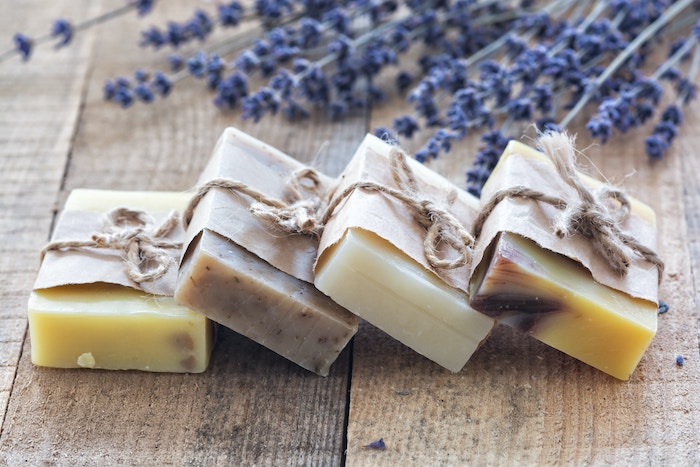
6 Best Plants For Soap Making
Opting for botanical ingredients over commercial ones in soap making presents numerous advantages, as they can offer a more natural, eco-friendly, and healthful experience.
Unlike commercial products that often contain synthetic fragrances, dyes, and preservatives, ingredients derived from plants are generally free of harmful chemicals and synthetic additives.
Some examples of 100% vegan ingredients include algae, bakuchiol, BHA, and Niacinamide.
Plant-based ingredients can be gentler on the skin and may also possess therapeutic properties that can enhance well-being. Moreover, using botanical ingredients can support environmental sustainability, as they are often biodegradable and sourced from renewable resources.
By choosing botanical ingredients, you can create soaps that are better for your skin, your health, and the planet. Read on to learn more about the six best plants for soap making.
Lavender (Lavandula angustifolia)
The soothing scent of lavender is unmistakable and has long been prized for its calming and relaxing effects. Lavender essential oil, extracted from the plant’s delicate purple flowers, adds an elegant touch to handmade soaps, imparting a delightful aroma that is beloved by many.
Not only does lavender’s aroma provide a sensory escape, but it also offers tangible benefits to the skin. It boasts antibacterial, anti-inflammatory, and anti-fungal properties, making it a versatile addition to any soap recipe.
Lavender-infused soaps can help alleviate irritation and redness, promote healing of minor wounds, and even soothe the symptoms of skin conditions such as eczema and psoriasis.
With its incredible array of benefits, lavender is undoubtedly a staple in the botanical soap maker’s arsenal.
Peppermint (Mentha piperita)
Peppermint, with its invigorating aroma and cooling sensation, is another favourite among soap makers. The plant’s essential oil, derived from its leaves, contains menthol, which is responsible for peppermint’s characteristic tingle.
Incorporating peppermint essential oil into soap recipes delivers an instant energy boost and a refreshing cleanse, perfect for early morning or post-workout showers.
Beyond its uplifting scent, peppermint essential oil has antimicrobial, antiviral, and anti-inflammatory properties. Peppermint-infused soaps can help combat acne-causing bacteria, relieve itching, and reduce inflammation on the skin.
This revitalising plant is a must-have for those looking to create invigorating, aromatic soaps.
Calendula (Calendula officinalis)

Calendula, also known as pot marigold, is a cheerful, yellow-orange flower with a long history of medicinal use. The petals of calendula contain a variety of compounds that are beneficial to the skin, including antioxidants, anti-inflammatory agents, and antiviral properties.
When incorporated into soaps, calendula not only imparts a warm, earthy hue but also provides a gentle, soothing effect on the skin. Ideal for sensitive skin, calendula-infused soaps can help reduce redness, alleviate itchiness, and promote healing of minor cuts and burns.
The petals can be infused into the soap-making oils or added directly into the soap batter for a visually appealing, speckled effect. With its skin-nourishing properties and vibrant colour, calendula is a brilliant addition to any soap-making endeavour.
Chamomile (Matricaria chamomilla)
Chamomile, with its delicate, daisy-like flowers, is a renowned herb for its calming and anti-inflammatory properties. Often used in teas to soothe the mind and body, chamomile also works wonders when infused into soaps.
Its essential oil, derived from the flowers, imparts a gentle, sweet fragrance that is reminiscent of crisp apples.
The therapeutic benefits of chamomile in soaps are numerous. It is known for its ability to calm irritated skin, reduce inflammation, and alleviate the symptoms of eczema and dermatitis. Moreover, chamomile’s mild and soothing nature makes it an ideal choice for those with sensitive skin or for crafting baby soaps.
The incorporation of chamomile into your soap recipes will not only provide a comforting scent but also bestow remarkable skin-soothing benefits.
Rosemary (Rosmarinus officinalis)

Rosemary, a popular culinary herb, also shines in the realm of sustainable soap making. Its needle-like leaves produce a distinct, invigorating essential oil with a robust, herbaceous aroma. Rosemary essential oil has a stimulating effect on the senses, making it an excellent choice for soaps designed to awaken and rejuvenate.
In addition to its energizing fragrance, rosemary essential oil possesses antimicrobial, anti-inflammatory, and antioxidant properties. Soaps infused with rosemary can help to improve circulation, combat acne-causing bacteria, and protect the skin from environmental stressors.
Incorporating rosemary into your soap recipes will yield a revitalizing and aromatic bathing experience while promoting overall skin health.
Lemongrass (Cymbopogon citratus)
Lemongrass, a tropical grass native to Asia, is celebrated for its fresh, citrusy scent and its diverse applications in cooking, aromatherapy, and skincare. Lemongrass essential oil, extracted from the plant’s leaves, imparts a crisp, clean fragrance that is invigorating and refreshing, making it an ideal ingredient for vibrant, uplifting soaps.
Beyond its captivating aroma, lemongrass essential oil offers several benefits for the skin. With its antimicrobial and antifungal properties, lemongrass-infused soaps can help combat body odor, inhibit the growth of bacteria, and soothe fungal infections. Additionally, the astringent properties of lemongrass can help tighten and tone the skin, making it an excellent choice for those seeking a natural, rejuvenating cleanse.
Conclusion
Botanicals offer a treasure trove of plants that can elevate the art of soap making. By incorporating these diverse, therapeutic plants into your soap recipes, you can create visually stunning and aromatic bars that bestow an array of skin-nourishing benefits.
Whether you opt for soothing lavender, invigorating peppermint, or vibrant marigold, the best plants for soap making are waiting to inspire your creativity and enhance your bathing rituals.












